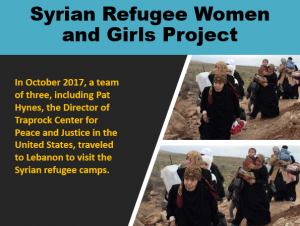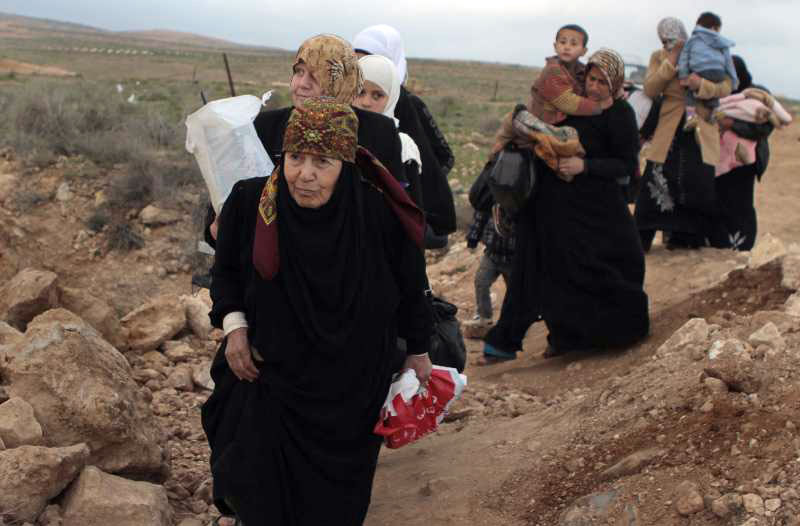In October 2017, a team of three from the international Coalition Against Trafficking in Women, Association IROKO (Italy) working with trafficked Nigerian women, and the Traprock Center for Peace and Justice (US) traveled to Lebanon for the following purposes:
(A.) To document the situation of Syrian women and girls escaping to Lebanon as war refugees and living in the refugee camps there, and
(B.) To spotlight the role of Syrian and Lebanese women as political actors, combating all forms of violence against women and creating programs for women and girl refugees that give them a future.
Read more about this project and view the slide presentation below.

(click to view)
Introduction to the Syrian Civil War
by Pat Hynes, March 2018

Part 1 – Pity the Nations: Women Refugees in Lebanon (posted December 6, 2017)
Part 2 – Being a Refugee Doesn’t Stop Political Engagement (posted December 7, 2017)
The conflict in Syria grew from the Assad government’s use of force against non-violent democracy-seeking Syrian protestors, known as Syria’s Arab Spring, in 2011. In this maelstrom, armed groups within Syria formed to fight Assad’s forces (and each other). ISIS (an outgrowth of Al-Qaeda Iraq – both largely products of the US 2003 war in Iraq with ISIS having gestated in the US prison at Camp Bucca, Iraq) mobilized with extreme violence to build a caliphate across northern Iraq and Syria. A decades-old proxy regional war with Saudi Arabia (supporting Sunni Islamic fundamentalists in Eastern Ghouta suburb of Damascus) pitted against Iran (supporting Hezbollah in Syria), and now new conflict involving Turkey against Syrian Kurds, as well as recent Israeli airstrikes – all within Syria – ensued. Simultaneously Russia and the United States, between them, armed many of the aggressors and undertook total war with extreme aerial bombing, on different sides of the war.
*********************
Immense ground assault and aerial bombing campaigns by all sides has created a wasteland of cities and villages in Syria (and the city of Mosul in Iraq) and eviscerated health care and education. Recently, General Joseph Votel, the US commander in the Middle East made an unprecedented call for the world’s help in rebuilding the completely shattered city of Raqqa – described as “a pile of broken concrete” and toxic rubble – leveled like Mosul in Iraq by US aerial bombardments, mortars, rockets and rocket-propelled grenades against ISIS. The city of 200,000 had reduced to 5,000 residents – those who fled becoming displaced persons and refugees.
This is the tale of Syria’s cities, industrial infrastructure and countryside, as the war raged over the past 7 years. ISIS is defeated, but has gone underground and fled to nearby countries. All sides have violated the Geneva Conventions regarding protection of civilians; and immense, sordid war profiteering ensued.
As the war winds down with the Syrian government (assisted by Russia and Iran) capturing remaining rebel strongholds in the southern part of the country, prospects of reform, reconciliation, reconstruction or closure barely exist, if at all. More than half of Syria’s population (est. 22 million before the war) is displaced within the country or war refugees in nearby countries.
The age-old mantra of war comes to mind: They had to destroy the country to save it.
*********************
The sorrows of war have preoccupied and sometimes haunted me for decades going back to the American war in Vietnam when the evening news, for the first time, carried realistic war footage. All that I learned since – from testimony and autobiography of war victims; from realistic, non-embedded coverage of war, particularly by women war journalists to the histories of various wars of the 20th and 21st centuries and UN studies on refugee camps – is that women and girls (largely non-combatants, non-aggressors, unarmed, displaced and refugees) – are war’s most dreadful and tragic victims.
“The law of the gun has devastated the condition of women.”
— UN representative to the Congo conflict